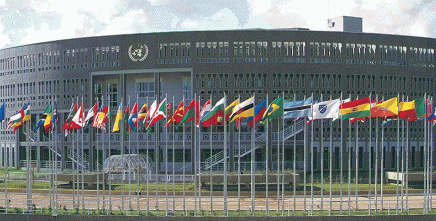Share this:
Trade in Services in Africa
24 November, 2021 to 25 November, 2021
Jointly Organized by the United Nations Conference on Trade and Development (UNCTAD) and the United Nations Economic Commission for Africa (UNECA)
The world faces multiple socio-economic challenges resulting from the COVID-19 pandemic. It has revealed extreme vulnerabilities of African economies, and especially the services sector to global markets. The impacts of COVID-19 have also taught us the importance of having a more digitally dynamic services sector which is better integrated into regional markets.
The services sector offers opportunities for the diversification of production and trade as an industry, or as enabler of growth and diversification in related sectors. Services such as transport, financial services, information and communications services, and energy services are characterized by their own value chains. They are also key contributors to other productive economic sectors. Moreover, the increasing servicification of the economies worldwide implies that services are now an important piece of the development puzzle. The economic performance of African economies is increasingly driven by the services sector – services value added represented more than 50 per cent of Africa’s GDP over the past two decades according to data from UNCTADStat. However, a main concern for services-led growth in Africa is that services-sector employment in most economies is neither technologically dynamic, nor its output tradeable. Yet, there are indications that some African countries and regions have been able to develop services that are relatively dynamic, and well-integrated into regional and global value chains in sectors such as banking, air transport and telecoms.
However, unlocking the full potential of Africa’s services sector implies that its contribution to economic performance and linkages to the productive sectors are fully understood to support timely policy-making process. This is very important, in particular at a time when the continent has embarked on the liberalization of its services sector under the African Continental Free Trade Area (AfCFTA). A major challenge that remains for African countries is how better assess the contribution of the services sectors to the economy and fully capture their linkages to global and regional value chains. This entails addressing constraints related to data gaps on services and strengthening capacities at national and regional levels to measure the value added generated by services sectors with a view to supporting policy-making processes.
This is the overarching goal of a technical assistance programme jointly designed and implemented by the United Nations Conference on Trade and Development (UNCTAD) and the United Nations Economic Commission for Africa (UNECA). Over the period 2018-2021, and under a project funded by the UN Development Account, the two institutions have been piloting the programme in six African countries, covering three services sectors (transport services for Ethiopia and Kenya; tourism services for The Gambia and Mali; and financial services for Nigeria and Togo). The project aims at strengthening capacities to measure the value added that is generated by the selected services sectors and supporting policy frameworks to maximize their contribution to national and regional value chains. Under the scope of the projects, support has been provided to the beneficiary countries to assess the impacts of COVID-19 on targeted services sectors and identify policy options to build resilience.
The scope of the project also includes the identification of best practices and the sharing of lessons learned as pilot countries apply the methodology developed to quantify and analyse specific services value chains. In this regard, UNCTAD and UNECA are convening a multi-stakeholder workshop on Trade in Services scheduled to take place on 24 and 25 November 2021 in Nairobi, Kenya.


